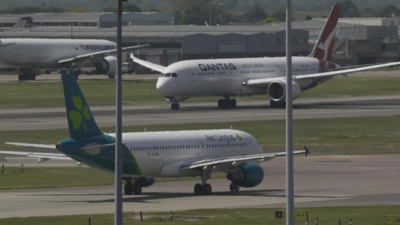Boeing Jet Returns to Seattle Amid U.S.-China Trade Tensions

SEATTLE: In a significant turn of events stemming from escalating trade tensions, a Boeing jet that was originally destined for Xiamen Airlines, a major carrier in China, has returned to the planemaker's production hub in the United States. This unexpected journey unfolded on Sunday, April 20, when the 737 MAX touched down at Boeing Field in Seattle at approximately 6:11 PM local time (9:11 AM Singapore time). Eyewitnesses from Reuters confirmed the aircraft was adorned with the distinctive livery of Xiamen Airlines.
This specific 737 MAX had embarked on an extensive return journey of about 8,000 kilometers, making refueling stops in Guam and Hawaii. The aircraft had been awaiting final work and delivery at Boeing's completion center located in Zhoushan, China. However, the ongoing trade disputes between the U.S. and China have created a complex web of tariff-related challenges that ultimately led to its return.
Recently, President Donald Trump escalated the trade war by increasing the baseline tariffs on Chinese imports to an astonishing 145 percent. In retaliation, the Chinese government imposed a staggering 125 percent tariff on American goods. Such punitive measures have the potential to severely impact a Chinese airline's ability to take delivery of a Boeing jet, especially considering that a new 737 MAX is valued at approximately $55 million according to IBA, an aviation consultancy.
As it stands, there remains ambiguity regarding who made the specific decision for the aircraft's return to the United States. Boeing has not yet provided a statement on the matter, and Xiamen Airlines also declined to comment on the situation. This incident represents another layer of disruption to the delivery process for new aircraft, a scenario that has been exacerbated by the collapse of the aerospace industry's long-standing duty-free status.
The return of the 737 MAX, which has historically been Boeings best-selling aircraft, underscores the ongoing turmoil within the aviation sector. This situation further complicates Boeing's recovery efforts as the company has been gradually rebounding from a nearly five-year import freeze on 737 MAX jets, alongside previous rounds of trade tensions that have plagued its operations.
Industry analysts have expressed concern that the uncertainty surrounding fluctuating tariffs could put numerous aircraft deliveries in a precarious situation. Some airline executives have indicated they might prefer deferring the delivery of planes rather than facing exorbitant duties. This sentiment reflects a growing anxiety within the industry as it grapples with the implications of the ongoing trade conflict and its potential impacts on future transactions.





















